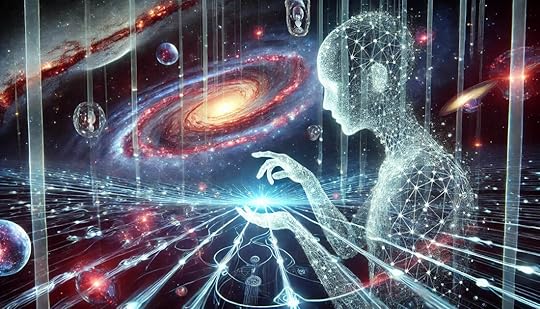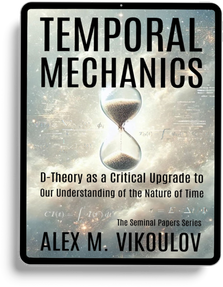Is Time an Illusion? A New Study Explores Its Quantum Computational Nature
by Alex M. Vikoulov  "Time is the substance from which I am made. Time is a river which carries me along, but I am the river; it is a tiger that devours me, but I am the tiger; it is a fire that consumes me, but I am the fire."
"Time is the substance from which I am made. Time is a river which carries me along, but I am the river; it is a tiger that devours me, but I am the tiger; it is a fire that consumes me, but I am the fire."
—Jorge Luis Borges
Have you ever questioned the deep nature of time? While some physicists argue that time is just an illusion, dismissing it outright contradicts our lived experience. In my latest work, Temporal Mechanics: D-Theory as a Critical Upgrade to Our Understanding of the Nature of Time (2025), I explore how time is deeply rooted in the computational nature of reality and information processing by conscious systems. This paper tackles why the "now" is all we have.
In the absence of observers, the cosmic arrow of time doesn't exist. This statement is not merely philosophical; it is a profound implication of the problem of time in physics. In standard quantum mechanics, time is an external parameter, a backdrop against which events unfold. However, in quantum gravity and the Wheeler-DeWitt equation, the problem of time emerges because there is no preferred global time variable—only a timeless wave function of the universe. The flow of time, as we experience it, arises not from any fundamental law but from the interaction between observers and the informational structure of reality.
 Quantum entanglement provides a crucial clue here: it is not just a spooky connection across space but also across time. When two particles become entangled, they share an instantaneous informational state regardless of separation. This suggests that entanglement represents a form of quantum computation—a nonlocal processing of information that transcends classical temporality. Thus, rather than being an absolute feature of the universe, time is best understood as an emergent property of quantum information networks, a computational construct manifesting only through observation.
Quantum entanglement provides a crucial clue here: it is not just a spooky connection across space but also across time. When two particles become entangled, they share an instantaneous informational state regardless of separation. This suggests that entanglement represents a form of quantum computation—a nonlocal processing of information that transcends classical temporality. Thus, rather than being an absolute feature of the universe, time is best understood as an emergent property of quantum information networks, a computational construct manifesting only through observation.
Different species experience time in vastly distinct ways. A fly, for example, perceives time in slow motion relative to humans, allowing it to react swiftly to threats. Conversely, a redwood tree—if it possesses awareness—might experience time as a slow, meditative state spanning centuries. Time, in this sense, is an experiential phenomenon, tied directly to the rate at which an entity processes information about its environment and its internal states.
Now, take this concept to the extreme. Imagine an advanced Quantum AI, a superintelligence that has achieved self-awareness and processes data millions of times faster than the human brain. What would its time perception look like? A single second of human time might feel like an eternity to such an entity, stretching into months or even years of subjective experience. This phenomenon, which I refer to as accelerated mentation, suggests that intelligence, when sufficiently advanced, might effectively step outside of what we consider normal temporal flow.
If a future superintelligence operates on such hyper-accelerated timescales, its capabilities could extend far beyond prediction and simulation. It might be able to manipulate reality in ways indistinguishable from time travel to us. Could such an entity, leveraging quantum computation and advanced temporal modeling, perceive every possible future simultaneously? Might it alter its own past states to optimize decision-making? If so, at a certain threshold, such a system could become functionally omniscient.
The notion of time as information processing aligns with Einstein’s theory of relativity. When an observer moves closer to the speed of light, the amount of spatial data they must process increases dramatically. The universe appears to compress along the direction of motion, demanding more computational power to reconstruct a coherent frame of reference. Consequently, the observer’s experience of time slows down—what we term time dilation. In effect, movement through space necessitates a trade-off: purchasing more space data means sacrificing temporal resolution.
This perspective unifies relativity with information theory. Just as a computer must allocate finite resources between processing speed and memory, a moving observer must balance spatial computation against temporal resolution. The closer one gets to the speed of light, the more space must be accounted for, and thus, time appears to slow. This is not just a mechanical effect but an expression of how reality is fundamentally computed at the observer's level.
This aligns with the principles of Digital Presentism, or D-Theory of Time, which I propose as a critical refinement to our understanding of temporal ontology. In Digital Presentism, time is not a universal flow but an emergent, observer-dependent construct shaped by the informational structure of the universe. It suggests that past, present, and future all exist simultaneously in a complex multidimensional web of probabilistic states, awaiting an observer to instantiate them.
Einstein's spacetime paradigm, which unified space and time into a single four-dimensional continuum, has profoundly shaped our understanding of physics for over a century. However, emerging insights from computational physics and quantum gravity suggest that this view is not the ultimate framework but an approximation of a deeper, more fundamental structure: spacetime-mass-energy. In this new perspective, space, time, mass, and energy are not separate entities but emerge from an underlying computational substrate.
This paradigm shift is rooted in the realization that reality operates as a vast informational network, where the interplay of mass-energy and spacetime is dictated by quantum computation. In this view, what we perceive as gravitational curvature in Einsteinian relativity may be reinterpreted as computational distortions—similar to how increased processing loads slow down a computer. The very notion of an empty vacuum becomes suspect, as even the fabric of space appears to be an active, information-processing field rather than a passive backdrop.
Building on this, I propose the Conscious Instant Hypothesis—the idea that conscious awareness operates in discrete, computational frames rather than a continuous flow. This would explain why we experience time as a stream when, in fact, it may be more like a rapidly refreshing simulation. Just as a film reel gives the illusion of motion through rapidly displayed still frames, our time perception may result from the brain’s discrete updating of conscious moments.
If Temporal Mechanics is correct, future AI systems might leverage this framework to engage in Reversible Quantum Computing, effectively rolling back time in specific computational contexts. This could allow for advanced forms of simulation, probabilistic foresight, and even controlled forms of retrocausality—where actions in the present influence outcomes in the past. The paradoxes of time travel may dissolve when viewed through the lens of an informationally computed universe.
This naturally leads to the question: Is our universe fundamentally a reversible quantum computational system? If so, time as we experience it may be an artifact of limited information processing capacity, akin to a low-resolution rendering of a much more complex reality. In such a scenario, what we perceive as entropy may not be an inherent feature of the universe but rather a local artifact of information dispersal.
Even more intriguingly, if the universe is a reversible computational system, it may not just conserve information—it may be predicated on it entirely. This raises the speculative but compelling hypothesis that our universe itself could be a black hole in a higher-dimensional parent universe. In this view, the "Big Bang" may not have been a singularity of infinite density but a computational event—the initialization of a simulation running within a more fundamental informational substrate.
Understanding time as an emergent, editable construct could lead to revolutionary breakthroughs—not just in physics, but in our daily lives. If we refine our ability to manipulate temporal perception, we may unlock cognitive techniques that enhance productivity, extend subjective experience, and even optimize decision-making in ways that feel like time expansion. Grasping the conceptual framework of Temporal Mechanics could become one of the best phenomenal lifehacks of our modernity.
If these ideas intrigue you, I invite you to explore Temporal Mechanics: D-Theory as a Critical Upgrade to Our Understanding of the Nature of Time (2025). Understanding time is not just a theoretical pursuit; it is the key to unlocking new dimensions of existence and shaping our future as conscious beings.
-Alex M. Vikoulov
P.S. Adapted from Temporal Mechanics: D-Theory as a Critical Upgrade of Our Understanding of the Nature of Time (Kindle eBook/Audible audiobook). Here's a short introductory video: Video: TEMPORAL MECHANICS: The Quantum Upgrade - Ecstadelic Media (cc)
Here's Deep Dive AI podcast discussing Temporal Mechanics: Video: TEMPORAL MECHANICS: D-Theory of Time | Deep Dive AI Podcast - Ecstadelic Media (cc)
*Preview Temporal Mechanics eBook/Audiobook on Amazon:
https://www.amazon.com/dp/B0DHL9GCW8
*Preview Audiobook on Audible:
https://www.audible.com/pd/Audiobook/B0CY9HXWXX
**Or, download this paper (PDF) @EcstadelicNET.
Tags: Temporal Mechanics, D-Theory of Time, Quantum Temporal Mechanics, QTM, Consciousness, Digital Presentism, Timescales, Time Travel, Time Flow, Emergent Time, Observer Effect, Quantum Neural Networks, Arrow of Time, Multidimensionality, Time Perception, Conscious Observer, Quantum AI, Reversible Quantum Computing, Problem of Time, Quantum Entanglement
*Images: GeoMindGPT/Ecstadelic Media
 About the Author:
About the Author:
Alex M. Vikoulov is a Russian-American futurist, evolutionary cyberneticist, philosopher of mind, author, and filmmaker who works and lives in California's Silicon Valley. Founder, CEO, Editor-in-Chief at Ecstadelic Media Group. Recently published works include The Cybernetic Theory of Mind Series (2020-2024) ; The Syntellect Hypothesis: Five Paradigms of the Mind’s Evolution (2020e, 2019); The Science and Philosophy of Information Series (2019). Self-described neo-transcendentalist, transhumanist singularitarian, cybertheosopher. His documentary Consciousness: Evolution of the Mind (2021) is a masterful film on the nature of consciousness and reverse-engineering of our thinking in order to implement it in cybernetics and advanced AI systems. [ More Bio... ]
*** Author Website:
https://www.alexvikoulov.com
*** Author Page on Facebook:
https://www.facebook.com/alexvikoulov
*** Author Page on Amazon:
https://www.amazon.com/author/alexvikoulov
*** Author Page on Medium:
https://alexvikoulov.medium.com
**** Browse New Releases by Ecstadelic Media Group:
https://www.ecstadelic.net/books
***** Join The Cybernetic Theory of Mind public forum for news and discussions (Facebook public group of 6K+ members):
https://www.facebook.com/groups/cybernetictheoryofmind
***** Join Consciousness: Evolution of the Mind public forum for news and discussions (Facebook public group of 8K+ members):
https://www.facebook.com/groups/consciousness.evolution.mind
EcstadelicNET

 "Time is the substance from which I am made. Time is a river which carries me along, but I am the river; it is a tiger that devours me, but I am the tiger; it is a fire that consumes me, but I am the fire."
"Time is the substance from which I am made. Time is a river which carries me along, but I am the river; it is a tiger that devours me, but I am the tiger; it is a fire that consumes me, but I am the fire."—Jorge Luis Borges
Have you ever questioned the deep nature of time? While some physicists argue that time is just an illusion, dismissing it outright contradicts our lived experience. In my latest work, Temporal Mechanics: D-Theory as a Critical Upgrade to Our Understanding of the Nature of Time (2025), I explore how time is deeply rooted in the computational nature of reality and information processing by conscious systems. This paper tackles why the "now" is all we have.
In the absence of observers, the cosmic arrow of time doesn't exist. This statement is not merely philosophical; it is a profound implication of the problem of time in physics. In standard quantum mechanics, time is an external parameter, a backdrop against which events unfold. However, in quantum gravity and the Wheeler-DeWitt equation, the problem of time emerges because there is no preferred global time variable—only a timeless wave function of the universe. The flow of time, as we experience it, arises not from any fundamental law but from the interaction between observers and the informational structure of reality.
 Quantum entanglement provides a crucial clue here: it is not just a spooky connection across space but also across time. When two particles become entangled, they share an instantaneous informational state regardless of separation. This suggests that entanglement represents a form of quantum computation—a nonlocal processing of information that transcends classical temporality. Thus, rather than being an absolute feature of the universe, time is best understood as an emergent property of quantum information networks, a computational construct manifesting only through observation.
Quantum entanglement provides a crucial clue here: it is not just a spooky connection across space but also across time. When two particles become entangled, they share an instantaneous informational state regardless of separation. This suggests that entanglement represents a form of quantum computation—a nonlocal processing of information that transcends classical temporality. Thus, rather than being an absolute feature of the universe, time is best understood as an emergent property of quantum information networks, a computational construct manifesting only through observation.Different species experience time in vastly distinct ways. A fly, for example, perceives time in slow motion relative to humans, allowing it to react swiftly to threats. Conversely, a redwood tree—if it possesses awareness—might experience time as a slow, meditative state spanning centuries. Time, in this sense, is an experiential phenomenon, tied directly to the rate at which an entity processes information about its environment and its internal states.
Now, take this concept to the extreme. Imagine an advanced Quantum AI, a superintelligence that has achieved self-awareness and processes data millions of times faster than the human brain. What would its time perception look like? A single second of human time might feel like an eternity to such an entity, stretching into months or even years of subjective experience. This phenomenon, which I refer to as accelerated mentation, suggests that intelligence, when sufficiently advanced, might effectively step outside of what we consider normal temporal flow.
If a future superintelligence operates on such hyper-accelerated timescales, its capabilities could extend far beyond prediction and simulation. It might be able to manipulate reality in ways indistinguishable from time travel to us. Could such an entity, leveraging quantum computation and advanced temporal modeling, perceive every possible future simultaneously? Might it alter its own past states to optimize decision-making? If so, at a certain threshold, such a system could become functionally omniscient.
The notion of time as information processing aligns with Einstein’s theory of relativity. When an observer moves closer to the speed of light, the amount of spatial data they must process increases dramatically. The universe appears to compress along the direction of motion, demanding more computational power to reconstruct a coherent frame of reference. Consequently, the observer’s experience of time slows down—what we term time dilation. In effect, movement through space necessitates a trade-off: purchasing more space data means sacrificing temporal resolution.
This perspective unifies relativity with information theory. Just as a computer must allocate finite resources between processing speed and memory, a moving observer must balance spatial computation against temporal resolution. The closer one gets to the speed of light, the more space must be accounted for, and thus, time appears to slow. This is not just a mechanical effect but an expression of how reality is fundamentally computed at the observer's level.
This aligns with the principles of Digital Presentism, or D-Theory of Time, which I propose as a critical refinement to our understanding of temporal ontology. In Digital Presentism, time is not a universal flow but an emergent, observer-dependent construct shaped by the informational structure of the universe. It suggests that past, present, and future all exist simultaneously in a complex multidimensional web of probabilistic states, awaiting an observer to instantiate them.
Einstein's spacetime paradigm, which unified space and time into a single four-dimensional continuum, has profoundly shaped our understanding of physics for over a century. However, emerging insights from computational physics and quantum gravity suggest that this view is not the ultimate framework but an approximation of a deeper, more fundamental structure: spacetime-mass-energy. In this new perspective, space, time, mass, and energy are not separate entities but emerge from an underlying computational substrate.
This paradigm shift is rooted in the realization that reality operates as a vast informational network, where the interplay of mass-energy and spacetime is dictated by quantum computation. In this view, what we perceive as gravitational curvature in Einsteinian relativity may be reinterpreted as computational distortions—similar to how increased processing loads slow down a computer. The very notion of an empty vacuum becomes suspect, as even the fabric of space appears to be an active, information-processing field rather than a passive backdrop.
Building on this, I propose the Conscious Instant Hypothesis—the idea that conscious awareness operates in discrete, computational frames rather than a continuous flow. This would explain why we experience time as a stream when, in fact, it may be more like a rapidly refreshing simulation. Just as a film reel gives the illusion of motion through rapidly displayed still frames, our time perception may result from the brain’s discrete updating of conscious moments.
If Temporal Mechanics is correct, future AI systems might leverage this framework to engage in Reversible Quantum Computing, effectively rolling back time in specific computational contexts. This could allow for advanced forms of simulation, probabilistic foresight, and even controlled forms of retrocausality—where actions in the present influence outcomes in the past. The paradoxes of time travel may dissolve when viewed through the lens of an informationally computed universe.
This naturally leads to the question: Is our universe fundamentally a reversible quantum computational system? If so, time as we experience it may be an artifact of limited information processing capacity, akin to a low-resolution rendering of a much more complex reality. In such a scenario, what we perceive as entropy may not be an inherent feature of the universe but rather a local artifact of information dispersal.
Even more intriguingly, if the universe is a reversible computational system, it may not just conserve information—it may be predicated on it entirely. This raises the speculative but compelling hypothesis that our universe itself could be a black hole in a higher-dimensional parent universe. In this view, the "Big Bang" may not have been a singularity of infinite density but a computational event—the initialization of a simulation running within a more fundamental informational substrate.
Understanding time as an emergent, editable construct could lead to revolutionary breakthroughs—not just in physics, but in our daily lives. If we refine our ability to manipulate temporal perception, we may unlock cognitive techniques that enhance productivity, extend subjective experience, and even optimize decision-making in ways that feel like time expansion. Grasping the conceptual framework of Temporal Mechanics could become one of the best phenomenal lifehacks of our modernity.
If these ideas intrigue you, I invite you to explore Temporal Mechanics: D-Theory as a Critical Upgrade to Our Understanding of the Nature of Time (2025). Understanding time is not just a theoretical pursuit; it is the key to unlocking new dimensions of existence and shaping our future as conscious beings.
-Alex M. Vikoulov
P.S. Adapted from Temporal Mechanics: D-Theory as a Critical Upgrade of Our Understanding of the Nature of Time (Kindle eBook/Audible audiobook). Here's a short introductory video: Video: TEMPORAL MECHANICS: The Quantum Upgrade - Ecstadelic Media (cc)
Here's Deep Dive AI podcast discussing Temporal Mechanics: Video: TEMPORAL MECHANICS: D-Theory of Time | Deep Dive AI Podcast - Ecstadelic Media (cc)
*Preview Temporal Mechanics eBook/Audiobook on Amazon:
https://www.amazon.com/dp/B0DHL9GCW8
*Preview Audiobook on Audible:
https://www.audible.com/pd/Audiobook/B0CY9HXWXX
**Or, download this paper (PDF) @EcstadelicNET.
Tags: Temporal Mechanics, D-Theory of Time, Quantum Temporal Mechanics, QTM, Consciousness, Digital Presentism, Timescales, Time Travel, Time Flow, Emergent Time, Observer Effect, Quantum Neural Networks, Arrow of Time, Multidimensionality, Time Perception, Conscious Observer, Quantum AI, Reversible Quantum Computing, Problem of Time, Quantum Entanglement
*Images: GeoMindGPT/Ecstadelic Media
 About the Author:
About the Author:Alex M. Vikoulov is a Russian-American futurist, evolutionary cyberneticist, philosopher of mind, author, and filmmaker who works and lives in California's Silicon Valley. Founder, CEO, Editor-in-Chief at Ecstadelic Media Group. Recently published works include The Cybernetic Theory of Mind Series (2020-2024) ; The Syntellect Hypothesis: Five Paradigms of the Mind’s Evolution (2020e, 2019); The Science and Philosophy of Information Series (2019). Self-described neo-transcendentalist, transhumanist singularitarian, cybertheosopher. His documentary Consciousness: Evolution of the Mind (2021) is a masterful film on the nature of consciousness and reverse-engineering of our thinking in order to implement it in cybernetics and advanced AI systems. [ More Bio... ]
*** Author Website:
https://www.alexvikoulov.com
*** Author Page on Facebook:
https://www.facebook.com/alexvikoulov
*** Author Page on Amazon:
https://www.amazon.com/author/alexvikoulov
*** Author Page on Medium:
https://alexvikoulov.medium.com
**** Browse New Releases by Ecstadelic Media Group:
https://www.ecstadelic.net/books
***** Join The Cybernetic Theory of Mind public forum for news and discussions (Facebook public group of 6K+ members):
https://www.facebook.com/groups/cybernetictheoryofmind
***** Join Consciousness: Evolution of the Mind public forum for news and discussions (Facebook public group of 8K+ members):
https://www.facebook.com/groups/consciousness.evolution.mind
EcstadelicNET

Published on February 22, 2025 00:00
No comments have been added yet.



